I will write more about the trip through the Philippines at some point, but now we are in Japan I wanted to get an update down before I forget it all.
Leaving the Philippines
We checked out in San Fernando La Union on the North west coast of the main Philippine island of Luzon, we had a lovely stop there, a local fisherman rowed out to us in his banca and offered to do any jobs we wanted, he took my diesel jugs ashore and returned with 60ltr of fuel, he also got us 30ltr of drinking water and finally he went to the timber yard for me and brought back two freshly sawn planks I could use as fender boards, I had heard they were a must in Japan. He did all of this with a smile and didn’t want very much for his time. 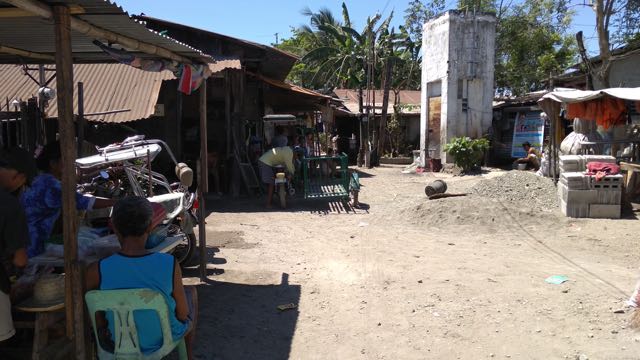 The people there were very poor, they lived in a small shanty like town on the edge of the beach, and although very basic, the people there seemed happy.
The people there were very poor, they lived in a small shanty like town on the edge of the beach, and although very basic, the people there seemed happy.
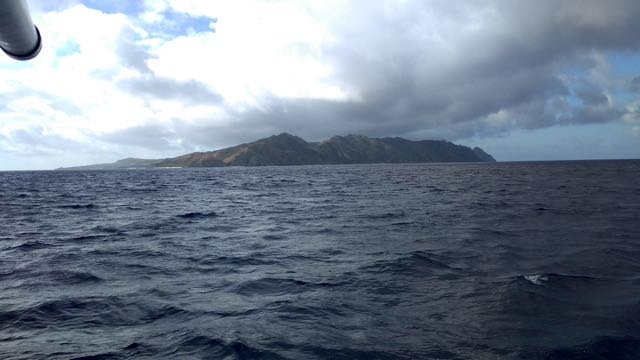
It was some 500 odd miles to the southern islands of Japan from there and we called into Basco port on Batanes Island, which was a days sails out of San Fernando. On the way we had an engine problem, it’s only small I think, some gas escaping on the cylinder head, it may be a gasket or the injector seating as that was a problem before. However I don’t fancy finding a mechanic in Japan, or paying his bill. We will have to see. Anyway the winds were good so we hoped to sail the rest of the way. We anchored just into the harbour, and had hoped to get a nights sleep in without any fuss, but the coastguard had other ideas and ordered me to visit him in his office, which was a right pain, as I had stowed the dinghy and outboard away, not expecting to need them before we got to Canada/America. Ashore he went over all my papers and passport and after 30 minutes of questioning I was told everything was fine and now I had to visit the port authority to get permission to stay. Eventually I was back on the boat and checked the weather, using our sat phone. Things were planned to get worse in 3 days time, so I suggested to Kathy we leave now, and try to beat the bad weather, as it was coming our way anyway, so off we went. We didn’t beat it.
Although the first night was calm, early in the evening I smelt a familiar smell, that of a battery gassing, our batteries are sealed and so can’t gas unless they are in a very bad way, I looked at the battery monitor and could see the battery volts to be very low, and given the strength of the smell I assumed things were not good. In a controlled panic sort of way we emptied pots pans, clothes , two bicycles, and much more junk out of the quarter berth, and removed the mattress to get to the battery bank. As I thought one of the batteries had gone into thermal run-away. I wasn’t quite sure where this might lead, but batteries can explode, I wondered if they can catch fire, so I very quickly unbolted the connections to it, and saw the battery voltage rise on the other 3 120AH batteries in parallel with it. I lifted the faulty battery out of its wooden box and let the air flow around it, it was too hot to touch. I think we just caught it in time. Kathy went to bed, and I continued with my watch.
The next morning we put the quarter berth back together, I replaced the faulty baterry with the engine starter battery, which was from the same batch. A few hours into daylight Kathy pointed out an approaching dark patch, the temperature was already dropping and it was a very grey day, within another hour it started raining then the wind hit us, we were now in the 20 knot range and the seas started to build quickly. I had hoped it was a squall, and the radar seemed to confirm this, yet when the rain passed, we still had grey skies, strong wind and building seas. A few hours later we were being thrown around something wicked.
Not long after this A pigeon landed on the boat and made it his home, shortly followed by four more pigeons. They were all ringed, so presumably they were on their way home. Kathy loved it, and tried to feed them some nuts and cereal, but they seemed fat enough and all it did was to create even more mess for me to clean up later. That night was difficult, there was no moon and with a cloud covered sky it was black. The wind was on the nose, the waves were about 10ft – 15ft high and we were going north, but a starboard tack sent us SW and a port tack sent us SE, so we were going backwards, and getting beaten up. In the end we tied the rudder midships, left the mainsail reefed and went below for the night. The boat moved along nicely at about 1.5 knots and we tried to get some sleep. At one point a very big wave lifted the boat up and spun us through 90 degrees or more, so that when we hit the water again we were on a different tack, but as we only had the main up we left it like that for a few more hours, perhaps the wind knew best.
They were all ringed, so presumably they were on their way home. Kathy loved it, and tried to feed them some nuts and cereal, but they seemed fat enough and all it did was to create even more mess for me to clean up later. That night was difficult, there was no moon and with a cloud covered sky it was black. The wind was on the nose, the waves were about 10ft – 15ft high and we were going north, but a starboard tack sent us SW and a port tack sent us SE, so we were going backwards, and getting beaten up. In the end we tied the rudder midships, left the mainsail reefed and went below for the night. The boat moved along nicely at about 1.5 knots and we tried to get some sleep. At one point a very big wave lifted the boat up and spun us through 90 degrees or more, so that when we hit the water again we were on a different tack, but as we only had the main up we left it like that for a few more hours, perhaps the wind knew best.
The next day was still rough but we could make a little progress forward, during the night the wind sensor failed to work, it’s wifi and often looses contact with the sender, I need to investigate. Also at one point the auto helm gave up against the seas and decided to send us back to the Philippines, I came on deck, stepping over pigeons to take control but found the wind sensor out, and worst of all the little LEDs that light the normal binnacle compass were out, so I couldn’t read it. In the total darkness, when you can’t see the sails, or the instruments, it’s very difficult to work out the course to steer. Also waves were making it into the cockpit and I had to have my full set of oililies on, and I was feeling cold and damp. I began to wonder what madness had driven me from Malaysia. Of course all was fixed with the help of a torch and a few resets on the wind sensor.
I began to wonder what madness had driven me from Malaysia. Of course all was fixed with the help of a torch and a few resets on the wind sensor.
The next day was predicted to be calmer by predictwind.com, our source of satellite weather data. It did calm a little and the pigeons all took off in unison, there were two great big ships on the horizon and I wondered if that was were they were heading.
Soon we were in the lee of Iriomote, a large island we have to go around to get to Ishigaki, and things calmed right down. Kathy sailed us into the harbour were we headed for the best berth that I had been informed of by a local I contacted via noon site.
On arriving at the port, the berth I wanted was full, the berths here consist of huge concrete walls you go alongside, mostly designed for big ships. A man came out and waved at us to go to a space on a nearby wall, which we did, he helpfully took our lines and immediately 3 coastguard (CG) officials turned up and introduced themselves. One was the official I had been in email contact with to notify them of our arrival. Pre arrival notification, along with the 7 page forms you have to send is just the start of a prolonged check in process that takes a day or two. The CG was very polite but also vert very keen that we stay on the boat until formalities had been completed, he even seemed upset that kathy put a hand on the wall. We waited an hour while the CG made phone calls and chatted amongst themselves before we were told we had to move to another berth. Then they arranged for one of the big (200ft) CG vessels to launch a RIB to guide us to the dock next to us, something we could have found ourselves by them pointing to the spot.
One was the official I had been in email contact with to notify them of our arrival. Pre arrival notification, along with the 7 page forms you have to send is just the start of a prolonged check in process that takes a day or two. The CG was very polite but also vert very keen that we stay on the boat until formalities had been completed, he even seemed upset that kathy put a hand on the wall. We waited an hour while the CG made phone calls and chatted amongst themselves before we were told we had to move to another berth. Then they arranged for one of the big (200ft) CG vessels to launch a RIB to guide us to the dock next to us, something we could have found ourselves by them pointing to the spot. 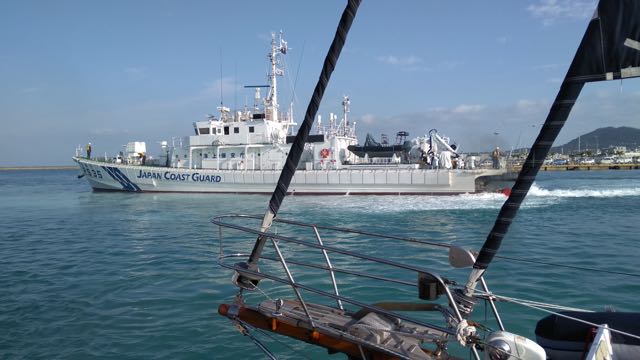 When we were in the new dock, much more foreboding in terms of concrete covered in barnacles, and also 6ft higher up than the decks on our little boat, the CG men reappeared, they were joined by several more CG staff. A regular occurrence over the next 2 days as we started the check in process. We were told to stay on the boat and Quarantine, customs and Immigration would be along soon. Sure enough they all duly turned up and I had 8 people in the cockpit taking turns to get me to fill in forms, customs, Quarantine and Coastguard. Immigration would be done later at the immigration office. While I was dealing with all of this the tide was dropping. I wasn’t allowed ashore to adjust the lines, and they had tied me off with little slack, I hadn’t noticed at first, but the boat was close to the wall, and some passing wake from a powerboat pushed us hard onto a big rubber fender bolted to the wall and smashed a chunk of caprail off, this is the very pretty wood that goes around the edge of the boat.
When we were in the new dock, much more foreboding in terms of concrete covered in barnacles, and also 6ft higher up than the decks on our little boat, the CG men reappeared, they were joined by several more CG staff. A regular occurrence over the next 2 days as we started the check in process. We were told to stay on the boat and Quarantine, customs and Immigration would be along soon. Sure enough they all duly turned up and I had 8 people in the cockpit taking turns to get me to fill in forms, customs, Quarantine and Coastguard. Immigration would be done later at the immigration office. While I was dealing with all of this the tide was dropping. I wasn’t allowed ashore to adjust the lines, and they had tied me off with little slack, I hadn’t noticed at first, but the boat was close to the wall, and some passing wake from a powerboat pushed us hard onto a big rubber fender bolted to the wall and smashed a chunk of caprail off, this is the very pretty wood that goes around the edge of the boat.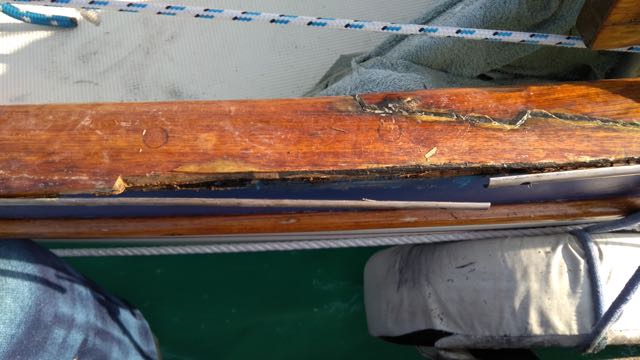 I pointed this out to Kathy and she went and had a look and came back and told me the bowsprit was smashed up. Fortunately it was only the platform,
I pointed this out to Kathy and she went and had a look and came back and told me the bowsprit was smashed up. Fortunately it was only the platform,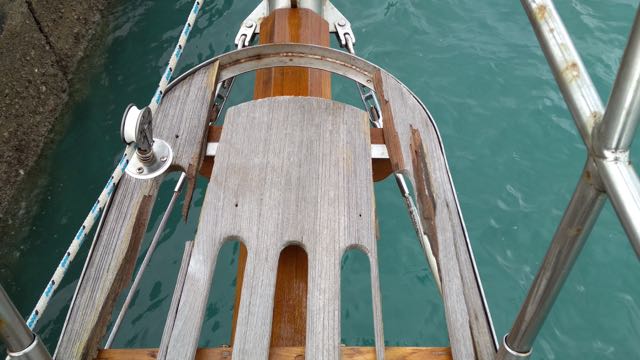 This was on the replacement list anyway, but I expect it smashed when we slammed down into a wave on the passage. I have sellotaped it back together and hope it will get us to America. I may have to screw some wooden slats over it to make it more secure.
This was on the replacement list anyway, but I expect it smashed when we slammed down into a wave on the passage. I have sellotaped it back together and hope it will get us to America. I may have to screw some wooden slats over it to make it more secure.
After a few hours they all left, customs did a search of the boat and took swabs from all the surfaces, Quarantine asked the usual question, did we have any dead animals on board, had anyone died on passage, were we ill etc. The coastguard wanted lots of documents we don’t have, Lloyds certificate, gross tonnage documentation, cargo description, last ten ports we called at! Had we ever been to North Korea? Later the Immigration officials drove us to their office were they very cheerfully gave us 3 month visas and drove us off to the port authority were we had to pay our dues for the concrete slab that was ripping our boat to bits. I paid for 5 days as I expected the boat jobs might take a while.
Thankfully by now I had rigged up fender boards from San Fernando and the boat was coping well.
Next we headed into town for some dinner and our first experience of Japanese culture. All I can say so far, things are different here, I didn’t spot a single chain/brand here, so far I haven’t been to a large town aywhere in the world that doesn’t have a McDonnell’s or Starbucks, but I haven’t seen one here yet, no Body Shop, no KFC, no Pizza Hut, but lots of very individual shops, bars and cafes. Kathy will elaborate I’m sure. We found the post office and got some YEN out, wandered around the market, I saw some amazing tuna loins, then found a nice bar that did food and had an english menu, and had dinner.
WiFi is proving difficult here, it’s complicated to get a SIM card, and prices are high, most people rent a MiFI data modem, but that’s difficult for us, I’m going to see if we can get one here and return it up near Tokyo. Until then I’m using roaming on my Malaysian SIM, or we use cafe internet.
I asked the CG today if they could help me get some fuel, this ended up with 8 CG staff all standing on the quay discussing the problem. after 30 minutes they arranged for a tanker to visit and refuel me. However they couldn’t fill my plastic jerry cans due to Japanese law saying cans must be made of stainless steel. They all disappeared and 30minutes later another man appeared saying he would wait until the tanker arrived. Not long after 6 CG people arrived and discussed the fuel situation. Then two guys turned up from environmental control, they advised that my boat could not be refuelled this way because of the chance of spillage from the deck filling point, given the ‘High Pressure’ from the truck. More flapping, more CG come and go, next a CG with some english explained that I could use my plastic cans with fuel in them to fill my tank and the lorry could fill the plastic cans, something that was illegal an hour ago. So I went to fill the tank with the 6 * 20ltr jerry cans, when there was uproar about a possible spillage, I showed them I could do it without spillage and they relaxed, until the 4th can, when the boss CG sent a man onboard to monitor my fuel gauge, and as it was showing 3/4 full he told me I could do no more in case it overflowed. I argued and tried to explain the gauge is not linear, and 3/4 meant there was room for another 50ltr, but he got pissed off with me and said he would cancel my request to visit the closed port. We compromised on another 20ltr.
The truck didn’t arrive, but one of the CG took my cans to the petrol station and filed them for me.
After the fuel was sorted I had to go to the Department of Transport to register my intent to visit some closed ports. Basically Japan has several thousand ports, and for many years no foreign ships were allowed into these ports without special government permission, after WWII they opened Tokyo to foreign ships, and later a handful of the bigger ports were opened, like Ishigaki where we are now. However several of the ports we wish to visit are still closed so we have to apply, in person, the the department of transport, in a building out of town for permission. it didn’t help that two of the ports we are visiting aren’t on their list of open or closed ports, so I have been told to apply for them in the office nearer to them when I get there. Customs here have already made me sign a form to say I can get 2 years in Jail and a 2,000,000 YEN fine for going to a closed port without the permit.
We ended the day with a trip to a supermarket a bit out of town which had a fantastic range of fresh food and fish followed by a lovely drink in a cafe with very fast internet.
I just received an email from the CG asking me if I got fuel and if so, can I call into their office to fill out a form for Ships taking on provisions. They like their paperwork here.
To be fair, the officials have all been extremely helpful and courteous, and given the communications problems, I can’t fault them, I think it might help them to see that yachts travel all around the world with very little paperwork, and it doesn’t seem to cause any problems.
Paul Collister
